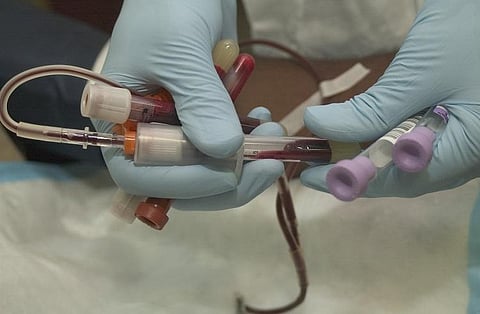

On November 29, doctors at Yangon General Hospital in Myanmar received two units of Bombay blood group sent all the way from Davangere city in Karnataka, to save the life of a 34-year-old woman, who had just undergone a mitral valve replacement. The patient was first transfused with two units of blood from her sister and another donor in Myanmar - the only two others known to have the rare blood group in the entire country.
However, her haemoglobin levels remained at 5, a stark contrast to the normal values for women, which is estimated on an average to be at around 13. On realising that it would be difficult to find someone with the same blood group in Myanmar, the patient’s doctor, haematologist Dr Sein Win, reached out to the Bengaluru-based Sankalpa Foundation’s Bombay Blood Group network, to arrange for an additional two units of blood.
“The haematologist in Myanmar found the contact of our blood bank and told us about a patient who had undergone a surgery and was in a critical state. The doctor also said that they required a transfusion of Bombay blood type at the earliest,” says Ankita, one of the senior members in charge of the Bengaluru-based Bombay Blood Group organisation.
“Following this we reached out to our community and managed to arrange for the blood to be sent to the woman in Myanmar,” she added.
How the blood units reached Myanmar in two days
Through its extensive network, Sankalp Foundation came to know that two units of the blood group were readily available at the SS Institute of Medical Science in Davanagere. Coordinating with Dr Kavitha GU and Dr Shashikala P from the institute’s blood bank as well as the principal of the medical college, Dr B S Prasad, the plan to obtain the units was put into action.
Next, they approached a man named Lakshminarayan, from Mumbai’s Yashraj Biotechnology, which is an exporter of biological samples throughout the world. He was able to put the organisation in touch with World Courier, who agreed to transport the blood to Myanmar soon.
The network of the organisation consists of over 250 members, who are all registered donors with the Bombay blood group. They keep track of all the units donated and where they had been collected. Blood banks, too, reach out to the organisation in case there is any deficit of the rare blood group.
“We’ve been working on this for over 10 years now and we have managed to develop a strong network of donors and banks,” adds Ankita.
However, the organisation admits that the task of transporting the units of blood to Myanmar was no cakewalk.
Once the blood was collected, it was packaged in a manner as to maintain the temperature between 2 and 8 degrees Celsius. It was picked up from Davanagere on November 27, after which it had to pass through paperwork formalities on the same day. Following this, the blood was sent to Bombay and then shipped off to Myanmar via Thailand. The two units of the blood finally reached Myanmar on the morning of November 29.
The blood was then transfused to the patient, who has now considerably improved and remains to be in a stable condition.
The network had earlier arranged for the blood to be sent to a woman in Pakistan in a similar manner.
Blood Groups and the Bombay Blood Group
Blood is classified into different groups or types based on the presence or absence of certain antigens, which are substances that can trigger the immune system to attack if they are foreign bodies. Introducing an antigen that the body is not familiar with may trigger the immune system to react to the same. As a result, blood transfusions take place after careful blood typing and crossmatching.
The presence or absence of two antigens, type A or B, on the surface of red blood cells, determine a person’s blood type (blood group). Further, the presence of a protein called the Rh factor determines whether someone has a positive or negative blood type. As a result, there are eight common blood groups: A positive and negative, B positive and negative, AB positive and negative and the O positive and negative blood groups.
People who are of the blood type O, do not show any antigens on their red blood cells, however they still can be typed as Rh negative or positive depending on whether the Rh protein is present or not.
Bombay blood group is a rare blood group in which the red blood cells do not have any of the ABO blood group antigens and have their own unique antigen. People with Bombay blood group can only receive blood donations from those with the same blood group.